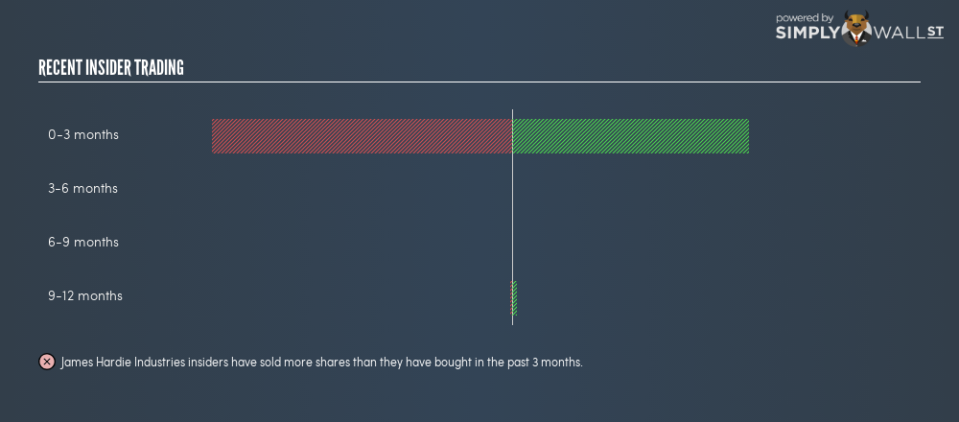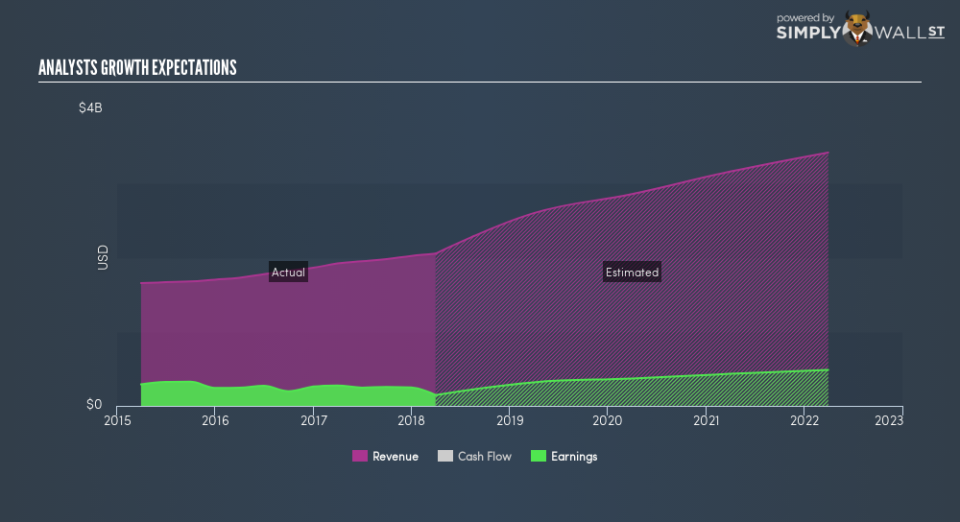James Hardie Industries plc’s (ASX:JHX) Insiders Just Sold Shares – Should You?

James Hardie Industries plc, together with its subsidiaries, manufactures and sells fiber cement siding and backer board products. James Hardie Industries’s insiders have divested from more than 24.05 million shares in the large-cap stock within the past three months. A well-known argument is that insiders divesting from their own companies’ shares sends a pessimistic signal. A research published in The MIT Press (1998) concluded that stocks following insider selling fell 2.7% compared to the market. However, it may not be sufficient to base your investment decision merely on these signals. Today we will evaluate whether these decisions are bolstered by analysts’ expectations of future growth as well as recent share price movements.
Check out our latest analysis for James Hardie Industries
Who Are Selling Their Shares?
More shares have been sold than bought by James Hardie Industries’s insiders in the past three months. In total, individual insiders own less than one million shares in the business, or around 0.20% of total shares outstanding. . The entity that sold on the open market in the last three months was FMR LLC. Although this is an institutional investor, rather than a company executive or board member, the insights gained from direct access to management as a large investor would make it more well-informed than the average retail investor. In this specific instance, I would classify this investor as a company insider.
Does Selling Activity Reflect Future Growth?
At first glance, analysts’ earnings expectations of 195.20% over the next three years illustrates an exceptional outlook for the business. However, this is inconsistent with the signal company insiders are sending with their net selling activity. Digging deeper into the line items, analysts anticipate a strong double-digit revenue growth next year, which appears to flow through to larger earnings growth expectations. This is potentially an outcome of successful growth initiatives in place and strong cost controls, leading to sustainable operations. Insider net selling activity is counter to what we’d expect given a significantly positive earnings outlook, indicating they may know something the market does not. Insiders could perceive the high growth as unsustainable or that it has been excessively factored into the current share price.
Did Insiders Sell On Share Price Volatility?
An alternative reason for recent trades could be insiders taking advantage of the share price volatility. A correlation could mean directors are trading on market inefficiencies based on their belief of the company’s intrinsic value. Within the past three months, James Hardie Industries’s share price traded at a high of A$23.74 and a low of A$21.36. This suggests a trivial share price movement, with a change of 11.14%. Potentially, insider transactions are not share price related but may be due to their belief on what will happen to the company in the future or simply just personal cash and diversification needs.
Next Steps:
James Hardie Industries’s net selling activity tells us the stock has fallen out of favour with some insiders as of late, though the positive growth in expected earnings tells us a different story, and the share price movement may be too trivial to cash in on any mispricing. But we must also be aware that insiders divesting may not actually be based their views on the company’s outlook. Moreover, while insider selling can be a useful prompt, following the lead of an insider, however, will never replace diligent research. I’ve put together two essential aspects you should look at:
Financial Health: Does James Hardie Industries have a healthy balance sheet? Take a look at our free balance sheet analysis with six simple checks on key factors like leverage and risk.
Other High Quality Alternatives : Are there other high quality stocks you could be holding instead of James Hardie Industries? Explore our interactive list of high quality stocks to get an idea of what else is out there you may be missing!
NB: Figures in this article are calculated using data from the last twelve months, which refer to the 12-month period ending on the last date of the month the financial statement is dated. This may not be consistent with full year annual report figures.
To help readers see past the short term volatility of the financial market, we aim to bring you a long-term focused research analysis purely driven by fundamental data. Note that our analysis does not factor in the latest price-sensitive company announcements.
The author is an independent contributor and at the time of publication had no position in the stocks mentioned. For errors that warrant correction please contact the editor at editorial-team@simplywallst.com.

 Yahoo Finance
Yahoo Finance 

